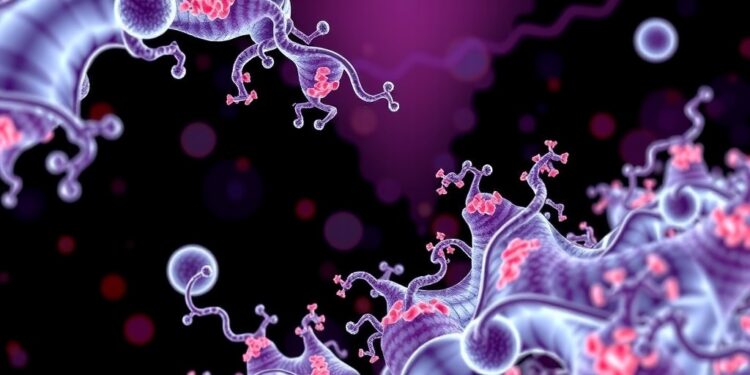
A new study published in Nature Human Behaviour unveils the intricate biological links between social isolation, loneliness, and a plethora of health outcomes, including cardiovascular disease, diabetes, and mortality. By leveraging data from 42,062 participants in the UK Biobank, the researchers have deciphered plasma proteomic signatures that provide a molecular-level understanding of how social relationships, or the lack thereof, influence human health.
Social connections are fundamental to human survival and well-being, yet modern societies face an increasing prevalence of social isolation and loneliness. These two constructs, while related, represent distinct facets of social disconnection: the former being an objective state of limited social interactions and the latter a subjective feeling of being alone. Both have been empirically linked to increased morbidity and mortality, with effects comparable to traditional risk factors like smoking and obesity. However, the biological mechanisms mediating these associations have remained elusive – until now.
This comprehensive study utilized high-throughput plasma proteomics to explore the proteomic profiles associated with social isolation and loneliness. The findings illuminate shared and distinct molecular pathways, particularly those involving inflammation, antiviral responses, and complement systems, that underlie the health impacts of social disconnection. Furthermore, the study extends beyond correlation, employing Mendelian randomization (MR) to infer causality, thereby identifying five key proteins—GFRA1, ADM, FABP4, TNFRSF10A, and ASGR1—as central mediators in the relationship between loneliness and adverse health outcomes.
Proteins, as the functional products of gene expression, are critical to understanding disease mechanisms and represent prime targets for therapeutic interventions. In this study, 776 proteins were initially associated with social isolation and 519 with loneliness, with 175 and 26 proteins, respectively, maintaining significance after rigorous statistical adjustments. Growth differentiation factor 15 (GDF15), an inflammatory marker, emerged as the most strongly associated protein with social isolation, while proprotein convertase subtilisin/kexin type 9 (PCSK9), a regulator of cholesterol metabolism, was most significantly linked to loneliness. Importantly, over 50% of these proteins were prospectively linked to major diseases and mortality over a 14-year follow-up.
The interplay between these proteins and health was further dissected using protein-protein interaction (PPI) networks and pathway enrichment analyses. Hub proteins such as interleukin 6 (IL6) and intercellular adhesion molecule-1 (ICAM1) were identified, underscoring the pivotal role of immune and inflammatory pathways in the biological impact of social disconnection. Notably, proteins linked to social isolation exhibited enrichment in complement activation and mitogen-activated protein kinase (MAPK)/extracellular signal-regulated kinase (ERK) signaling pathways, while loneliness was associated with metabolic and antiviral processes.
Building on these findings, the study employed MR analysis to infer causal relationships. Loneliness was causally linked to changes in the abundance of five proteins, with ADM and ASGR1 showing strong evidence of colocalization, indicating a shared genetic basis for loneliness and these protein levels. ADM, a protein involved in neuroendocrine stress responses and inflammation, exhibited robust associations with systemic biomarkers such as C-reactive protein (CRP) and brain regions implicated in interoception and emotional processing. These findings highlight ADM’s central role in translating the experience of loneliness into physiological changes that predispose individuals to disease.
The study also explored the mediating role of these proteins in the relationship between loneliness and health outcomes. ADM was identified as a key mediator, explaining up to 16.3% of the excess mortality risk associated with loneliness. The findings suggest that loneliness exerts its health effects not only through behavioral pathways, such as reduced physical activity or unhealthy diets, but also through direct biological mechanisms involving specific proteins and pathways.
To validate these findings, the researchers conducted extensive sensitivity analyses, including stratified analyses by sex, age, and ethnicity, as well as replication in a representative subset of the UK Biobank. The robustness of the results was further supported by cross-validation, colocalization analyses, and mediation modeling. While the study is limited by the observational nature of the data and the inability to measure protein levels in specific tissues, the authors argue that the plasma proteome provides a valuable window into systemic physiological processes.
This research represents a significant leap forward in understanding the biological basis of social relationships and their impact on health. By identifying specific proteins and pathways involved in the effects of social isolation and loneliness, the study opens new avenues for targeted interventions. Potential strategies could include developing drugs that modulate the activity of these proteins, designing biomarkers for early detection of at-risk individuals, or implementing public health policies aimed at reducing social disconnection.
The study underscores the critical importance of social relationships for human health and survival. The proteomic signatures of social isolation and loneliness reveal a complex interplay between biological, psychological, and social factors, offering a comprehensive framework for addressing the health consequences of social disconnection. As societies grapple with the challenges of an increasingly disconnected world, these findings provide a compelling case for prioritizing social relationships as a public health imperative.
Subject of Research: Plasma proteomics and social relationships
Article Title: Plasma proteomic signatures of social isolation and loneliness associated with morbidity and mortality
News Publication Date: 03 January 2025
Article Doi References: 10.1038/s41562-025-00987-5
Image Credits: Not specified
Keywords: Social isolation, Loneliness, Plasma proteomics, Morbidity, Mortality, Inflammation, Mendelian randomization, Public health, Cardiovascular disease, ADM protein





